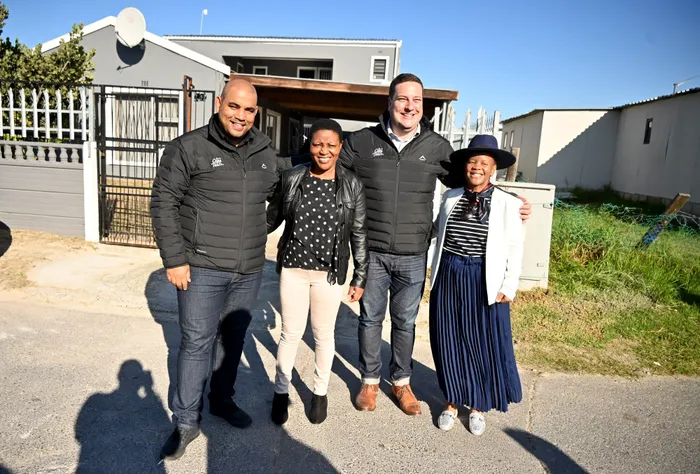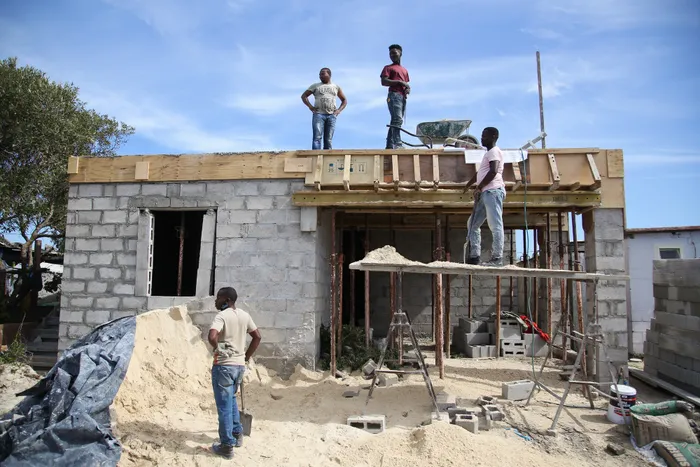
Nyanga is one of the townships that will benefit small-scale residential developers in providing affordable and formal accommodation.
Image: Armand Hough/Independent Newspapers
The City of Cape Town's amendment to its Municipal Planning By-law promotes development within city regulations, and has been hailed as "a big step in the right direction" by micro-developers, NGOs, financiers, academia and professionals working in the field.
These professionals have long championed for the opening up of opportunities to unlock affordable housing in informal and lower-income neighbourhoods, fighting for the recognition of the up-and-coming township micro-developers.
They have been knocking on all doors to ensure the opening of the pipeline for these fast-scale micro developments, which is helping solve Cape Town's housing crisis.
"The work in this arena over the past few years between the private sector, NGOs, academia and the City of Cape Town, shows that things can be done when you get all these parties playing a role," says Professor Francois Viruly, who has been playing at a grassroots role in the burgeoning mircor-development in townships.

Deputy Mayor Eddie Andrews, micro-developer and owner Zandile Nakani, Geordin Hill-Lewis Executive Mayor of Cape Town and uMastandi Portfolio Manager, Nomfundo Molemohi, during a walkabout last year of micro developments in Eersterivier.
Image: Ayanda Ndamane / Independent Newspapers
The amendment introduces a new land-use right that allows homeowners in 194 designated communities to legally build affordable rental units on their properties. These areas have seen rapid densification over the past decade, particularly through backyarder dwellings and informal structures.
While some criticise the amendent for further entrenching apartheid spatial development as it relates mostly to townships areas, those in this end of the housing market have applauded it.
"This Municipal Planning By-Law Amendment is a major milestone for township development and a significant victory for landlords and micro-developers in Cape Town’s townships," says Nomfundo Molemohi, uMaStandi portfolio manager, Eastern and Western Cape.
Molemohi was one of the first people to knock on the mayor's door to ask for assitance in unlocking the potential of township micro-developers to help solve the city's low-cost housng crisis.

Nomfundo Molemohi, uMaStandi portfolio manager, Eastern and Western Cape.
Image: Supplied
uMaStandi is one of the property financing companies for micro developers, providing commercial mortgage finance, training, mentorship and guidance to property entrepreneurs wanting to build quality, compliant and sustainable income-producing rental accommodation in townships.
"This Municipal Planning By-Law Amendment represents the kind of inclusive, practical policy shift that our communities have needed for years.
"This process started several years ago when uMaStandi, as a pioneering financier in this space, went to knock on the Mayor’s door literally asking the City to recognise and support the township landlords who were already driving a quiet rental revolution.
"What followed were years of technical consultations, back-and-forth policy work and tireless advocacy to get to this point.
"Previously, most township areas were zoned SR1 or SR2, allowing only up to three dwellings per plot. Any attempt to build more required a costly, complicated rezoning process, a major barrier for small-scale developers. With this amendment, landlords can now submit building plans (without rezoning) to build between eight and 12 units, depending on erf size.
"The City has also introduced prototypical plans to fast-track approvals and reduce professional fees, making the process quicker and more accessible.
"This change not only opens the door to new rental developments, but also creates an opportunity for existing landlords to formalise what they’ve built, obtain approved plans, increase their property values, and even unlock refinancing. It’s a powerful shift that will transform Cape Town’s landscape, particularly in historically excluded areas and a win for both micro-developers and the broader housing sector," she said.

Zama Mgwatyu, Development Action Group's (Dag) programme manager.
Image: Supplied
Development Action Group's (Dag) programme manager, Zama Mgwatyu - who has also been championing the cause for many years - says "amending a municipal bylaw is akin to turning an oil tanker - it demands time, courage, resilience, and collaboration with diverse stakeholders. This milestone follows years of advocacy for recognising small-scale rental housing, a sector that has thrived despite limited government support".

Property township micro-developers are addressing the affordable housing crisis.
Image: Supplied: DAG
The development agency sees micro-developers as addressing “crucial societal needs ... we tick all the boxes that national government is trying to tick from poverty alleviation, to job creation, to creating asset wealth, safety and security plus more”.
He said Dag and its sector partners pioneered an unconventional approach, engaging with a sector often viewed as operating outside the law.
"Through persistent research, strategic meetings with CCT officials and political leaders since 2017, and targeted advocacy, our efforts paid off: in 2022, the CCT Mayor prioritised small-scale rental housing, paving the way for city support to scale up micro-developers' work."
Asked why the amendments were important, he said they empowered small-scale developers to build up to 12 rental units on SR1/SR2 properties without costly and time-consuming rezoning applications, adding, "this change incentivises micro-developers and homeowner-developers to invest in 194 targeted areas with high demand for affordable rentals."

Professor Francois Viruly has hailed the collaboration that led to change in the micro-development sector.
Image: Supplied
Professor Viruly pointed out that 70 percent of title deeds in the country - about six million - are properties worth under a million rand.
"So when we talk about the affordable housing market, it is not just a segment of the market, it is actually the South African property market."
He said government housing programmes had slowed down over the past 10 years, and traditional developers left, slowing down delivery.
"I think there was a realisation that housing delivery could only take place through the private sector, and in particular, the small-scale developers.
"Indirectly, what it also does is promote property entrepreneurship in South Africa."
Viruly hailed the alliance that was developed over the past few years between the private sector, NGOs, academia and the City of Cape Town, "which shows that things can be done when you get all these parties playing a role".
"Going forward, what will be important is trying to ensure that the particular programme is effective, and I think this is going to be the crux for the next few years, whether we can create the institutions, the offices that can support these small-scale developers," he said.

The developments, mostly double-storey homes, can contain up to 10 units, with rents ranging between R1 500 and R3 000. Picture: Rob McGaffin It has been happening for a while: developments, mostly double-storey homes, crents ranging between R1 500 to R5000, have been mushrooming up.
Image: Rob McGaffin
During his announcement, Hill-Lewis acknowledged that micro-developers in townships have already been meeting housing demand at a scale the State cannot match.
He described the City’s role not as one of obstruction, but of enablement: “Now we are playing our proper role – not standing in the way, but enabling this form of housing delivery, driven by people's own enterprise, ingenuity, and investment.”
The amendment's passage was not easy, with the ANC abstaining from the vote, while the Democratic Alliance (DA), which holds a majority in Council, voted in support of the amendment. It faced opposition from several parties, including the EFF, Al Jama-ah, the National Coloured Congress (NCC), GOOD Party, Cape Exit, the PAC, and the Freedom Front Plus.
The Good Party's Brett Herron slammed the plan in a TikTok video, saying it achieved what the apartheid achitects never could - enforcing the Group Areas Act in Cape Town.
He said the demarcated areas - from Atlantis to Lakeside - closely resemble the original Group Areas Act maps, "but avoids the old white areas, the CBD and well located areas in Cape Town".
"It entrenches the densification, the segregation and exclusion of African and coloured South Africans in Cape Town. Welcome to the apartheid city," he said.
Responding to Herron's remarks, Mgwatyu said Dag celebrated the milestone, but acknowledged much work was needed.
"Over 30 years into our democracy, South Africa still grapples with the spatial planning legacy of apartheid, evident in new housing projects located far from opportunities. While the new bylaw promotes development within city regulations, it alone cannot address these challenges.
"We need a collaborative effort from various stakeholders to propose innovative solutions. The approach taken by the Small-Scale Rental Housing sector in engaging with the City of Cape Town to come up with regulatory reforms and support micro-developers is a model worth emulating. The spatial challenges we face demand a solution-driven approach from all of us, moving beyond merely articulating problems."

Dylan Walls, COO of Bitprop.
Image: Supplied
Dylan Walls, COO of Bitprop, which invests in rental units on low-oncome areas, is upbeat about the announcement, saying they've been campaigning for this over the past five years.
"It acknowledges what’s happening on the ground in township development and establishes a formal, accessible way for property owners to engage in backyard rental development legally and according to all regulations.
"Township rental property is a huge value creation mechanism in our economy and a crucial source of income and long-term wealth development for families, so this is a huge thing."
Walls adds that while the by-law change is a major step, without funding support and education in architecture, town planning and construction expertise, "it will remain difficult for the average property owner to access, so the next step is to secure decent support along these lines."
He emphasises, though, that this move is something property owners in such areas have been caling for over many years.
"Backyard development has been one of the biggest creators of income and proper wealth in the absence of employment opportunities. The reality is that if you don’t have a large enough income (or no income), no savings product that exists will work for you and you will have to live paycheck to paycheck, or on a pension.
"But if you do have a property, using the latent value in that property gives you a way to create income and inheritable wealth for your children you would otherwise not be able to achieve.
"...Given the growth in population and urbanisation globally and especially in Africa (South African cities not excluded from that trend), densification will happen everywhere, whether formally or informally, and we can only hope it will be formally, which is what something like this new by-law intends to guide," Walls said.
Walls added: "A city like Cape Town in 30 years might be like a very dense city like São Paulo is today, and the by-law lays the groundwork to ensure that densification happens in a sustainable way that can serve all citizens now and in the future."

Deon van Zyl, chairperson of the Western Cape Property Development Forum.
Image: Supplied
Deon van Zyl, chairperson of the Western Cape Property Development Forum (WCPDF) said the law change was welcomed by the property development and construction industry which has long called for clarity on zoning, the need to reduce red tape and providing critical support for small-scale residential developers.
Van Zyl said a number of benefits would result, including recognition of these small-scale developers - a first for the country.
"Land use and building plan applications can now run in parallel with administrative penalty processes, which should relieve officials from some administrative bottlenecks and, in turn, hopefully result in quicker and more efficient decision making. This is sorely needed.
"Changes in the by-law now give greater certainty to both micro developers and funders. The door has been opened for the next step: the formalisation of pre-approved building plans allowing small-scale developers to break ground much quicker. We trust that the banking sector will now provide the much-needed support based on the platform created by the by-law," he said.
On criticism of the amendment, Van Zyl said that although it was not perfect, it is a substantial step in the right direction, arguing that, "micro-developers are the ones who are basically very pro-active in solving the problem around, and providing, affordable housing much faster than government is able to do".
"We call on all other Western Cape municipalities to follow the lead of Cape Town and to look at ways to support small-scale residential developers and continue to work on simplifying and reducing red tape caused by their respective land use bylaws," he said.
Related Topics:
